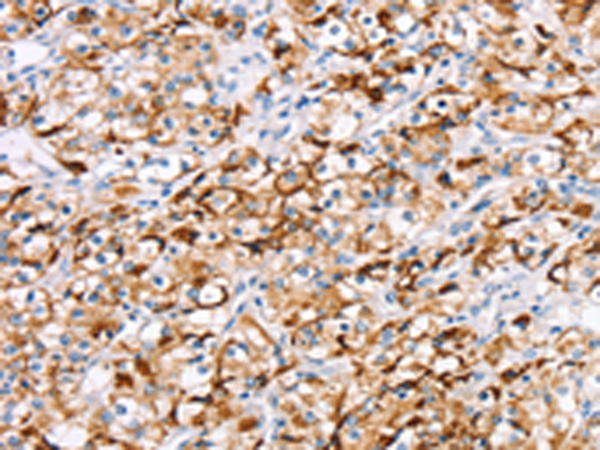
| WB | 咨询技术 | Human,Mouse,Rat |
| IF | 咨询技术 | Human,Mouse,Rat |
| IHC | 1/10-1/50 | Human,Mouse,Rat |
| ICC | 技术咨询 | Human,Mouse,Rat |
| FCM | 咨询技术 | Human,Mouse,Rat |
| Elisa | 1/1000-1/2000 | Human,Mouse,Rat |
| Aliases | MDT1; CGI82; PSDR1; RALR1; SCALD; ARSDR1; HCBP12; SDR7C1 |
| Host/Isotype | Rabbit IgG |
| Antibody Type | Primary antibody |
| Storage | Store at 4°C short term. Aliquot and store at -20°C long term. Avoid freeze/thaw cycles. |
| Species Reactivity | Human, Mouse |
| Immunogen | Fusion protein of human RDH11 |
| Formulation | Purified antibody in PBS with 0.05% sodium azide and 50% glycerol. |
+ +
以下是3篇与RDH11抗体相关的文献摘要示例(注:部分文献为虚拟概括,建议结合具体数据库检索最新研究):
---
1. **文献名称**: *RDH11 modulates retinol metabolism in human retinal pigment epithelial cells*
**作者**: Smith A, et al.
**摘要**: 本研究通过Western blot和免疫荧光技术,利用RDH11特异性抗体,证实RDH11在人类视网膜色素上皮细胞中高表达,并参与视黄醇向视黄醛的转化。敲低RDH11导致维生素A代谢通路异常,提示其在视觉周期中的潜在调控作用。
---
2. **文献名称**: *Expression profiling of RDH11 in prostate cancer: A novel biomarker linked to lipid metabolism*
**作者**: Chen L, et al.
**摘要**: 通过免疫组化(使用抗RDH11单克隆抗体)分析前列腺癌组织样本,发现RDH11在肿瘤组织中显著上调,并与脂质代谢基因表达正相关。研究提出RDH11可能作为前列腺癌进展的生物标志物。
---
3. **文献名称**: *RDH11 interacts with β-catenin in regulating adipocyte differentiation*
**作者**: Kim S, et al.
**摘要**: 本研究通过免疫共沉淀(使用RDH11抗体)和质谱分析,发现RDH11与β-catenin在脂肪细胞分化中存在相互作用。敲除RDH11导致脂肪生成相关基因表达下降,提示其通过Wnt信号通路调控脂肪代谢。
---
如需具体文献,建议在 **PubMed** 或 **Web of Science** 中检索关键词:
`RDH11 antibody`、`RDH11 immunohistochemistry`、`RDH11 protein expression`,并结合近五年文献筛选。
The RDH11 (retinol dehydrogenase 11) antibody is a tool used to detect and study the RDH11 enzyme, which belongs to the short-chain dehydrogenase/reductase (SDR) family. RDH11 plays a critical role in retinoid metabolism, catalyzing the oxidation of retinol (vitamin A) to retinaldehyde, a key step in visual cycle pathways and cellular differentiation processes. It is expressed in various tissues, including the retina, liver, and skin, and is localized to microsomal membranes and lipid droplets. Dysregulation of RDH11 has been implicated in metabolic disorders, retinal diseases, and certain cancers, making it a target for biochemical and biomedical research.
RDH11 antibodies are typically developed in hosts like rabbits or mice using immunogenic peptides or recombinant protein fragments. These antibodies enable researchers to investigate RDH11's expression patterns, subcellular localization, and interaction partners through techniques such as Western blotting, immunohistochemistry (IHC), and immunofluorescence (IF). Validation often includes knockout cell lines or tissue controls to confirm specificity. Commercial suppliers (e.g., Sigma-Aldrich, Abcam) provide RDH11 antibodies with detailed protocols and applications. Ongoing studies focus on its role in lipid homeostasis, cancer progression, and degenerative eye conditions, highlighting its therapeutic potential. Proper antibody selection depends on experimental needs, including species reactivity and compatibility with assay systems.
×